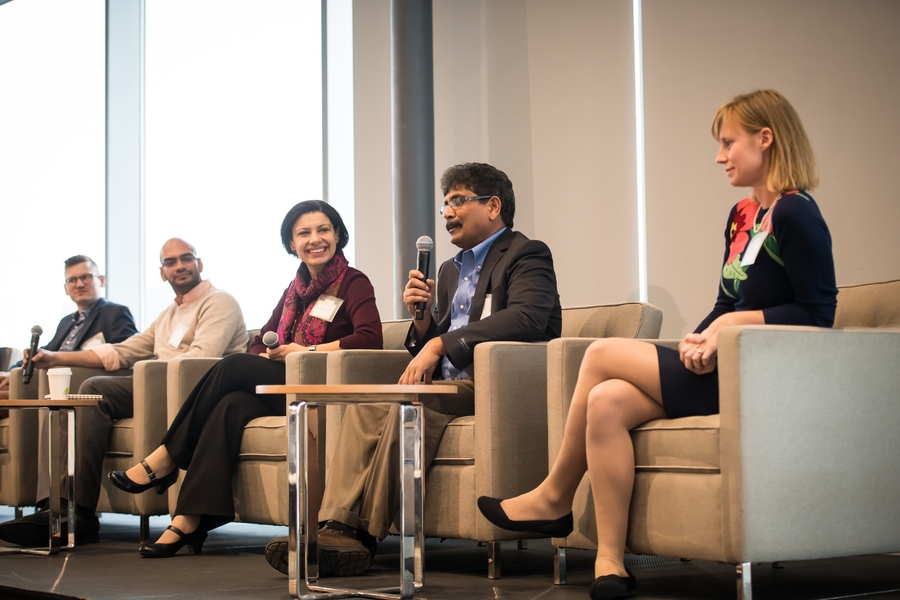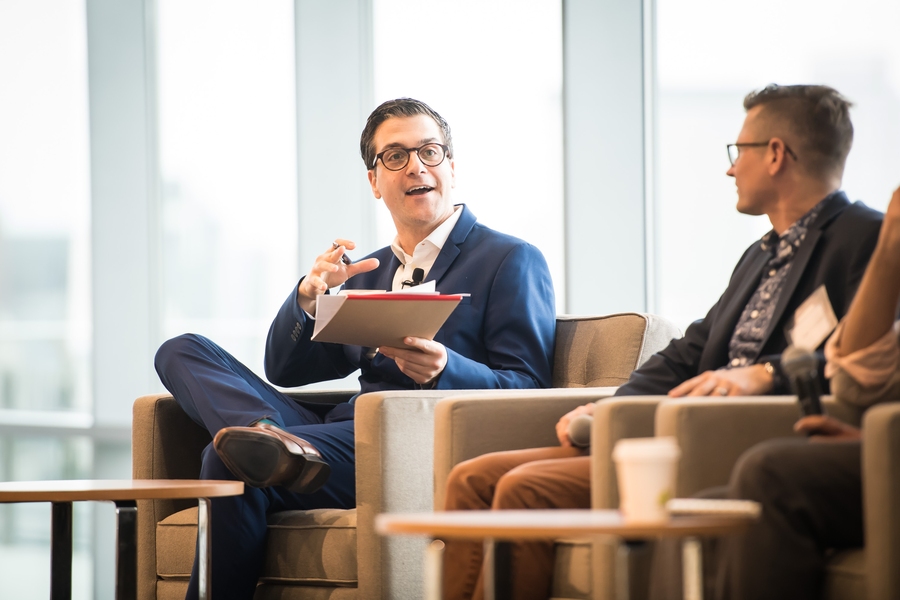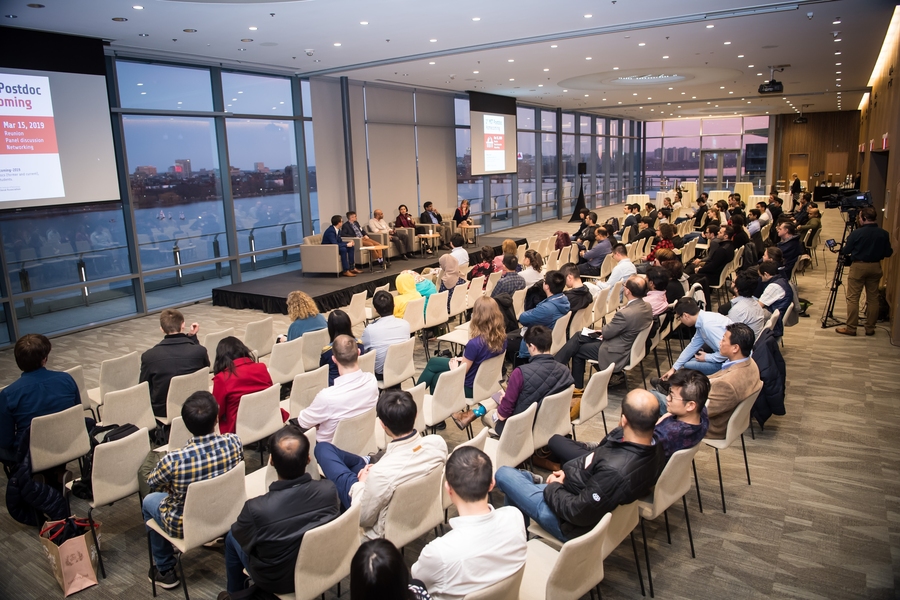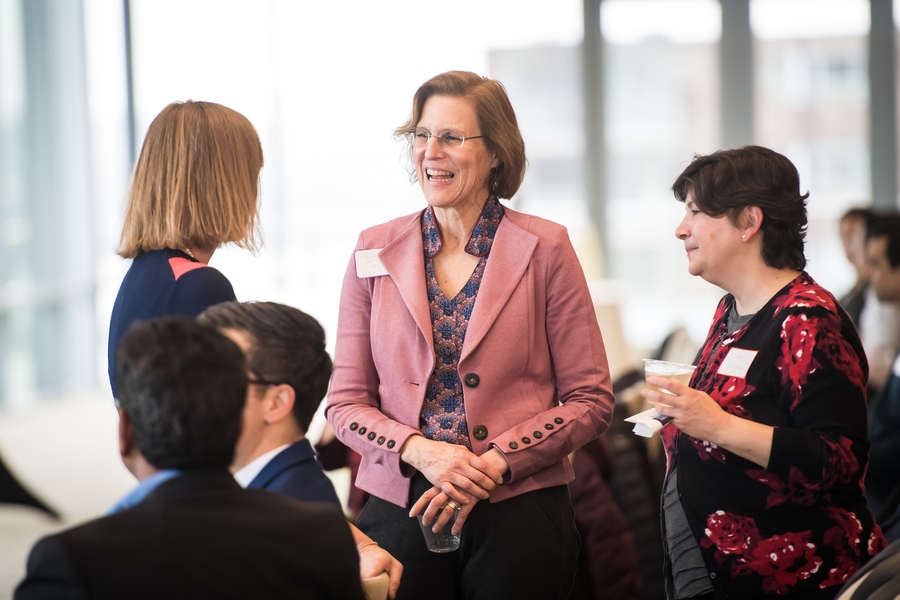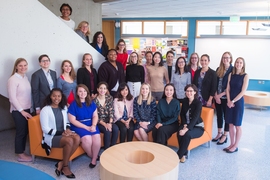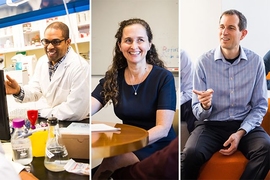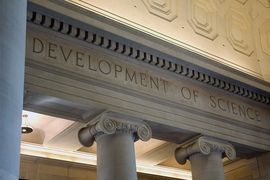One evening last November, something unexpected came out of a microfluidics and nanofluidics lab at MIT.
As postdocs David Cheng and Rozzeta Dolah ran an experiment, their conversation drifted from the work at hand to their future plans. “It’s a somewhat inevitable question that postdocs hate ... yet just cannot escape from discussing,” says Cheng. Both wished they had more role models, particularly past postdocs, that they could reach out to for advice.
Then an idea emerged. What about holding an event to enable current and former postdocs to network and share experiences?
Cheng and Dolah — officers of the MIT Postdoctoral Association (PDA) — ended up doing just that, hosting the first-ever MIT PDA Homecoming on March 15. With support from the Office of the Vice President for Research (VPR) and the MIT Alumni Association, the PDA organized a panel discussion and reception that drew more than 120 attendees, including 21 past postdocs and a number of current students.
Five former postdocs with a range of academic and industry experience participated in the panel: Brent Grocholski, a physical science associate editor for Science; Sisir Karumanchi, a robotics technologist in mobility and robotics systems at NASA’s Jet Propulsion Laboratory; Lamia Youseff, a research scientist in scalable machine learning at Stanford University and a Sloan Fellow at Stanford’s business school; Rajesh Jugulum, an infomatics director at CIGNA and adjunct professor at Northeastern University; and Virginia Burger, a senior scientist and director of scientific collaborations at XtalPi, Inc.
The event kicked off with virtual remarks from Vice President for Research Maria Zuber, whose office provides oversight of postdoctoral affairs, and professor of physics Edmund Bertschinger, who serves as faculty mentor to the PDA. Zuber noted recent enhancements, done in collaboration with the PDA, to support the over 1,500 postdocs at MIT. They include an increased focus on mentoring, career guidance, and professional development; partnering with the Alumni Association to offer postdocs access to infinite connection accounts and the job board, and adding postdoc representation to Institute committees.
“While we have more to achieve in the coming years, let us take pride and celebrate the success of our past and current postdocs,” Zuber said. “May the bonds of MIT and the spirit of 'mens et manus' ['mind and hand'] guide us as we strive to create new knowledge and transform society for the better, wherever we are.”
Both Zuber and Bertschinger offered special recognition to Dana Bresee Keeth, director of postdoctoral services in VPR. Keeth plans to retire this month after eight years of service in that role.
Alex Albanese, a postdoc in the Institute for Medical Engineering and Science, moderated a panel discussion. His “full-time hobby” is producing a podcast called GLiMPSE, offering a window into the work of postdocs and scientists across MIT. “The diversity of cultures, perspectives, and scientific backgrounds never ceases to amaze me,” he said in his opening remarks. Albanese peppered the panelists with questions about their postdoc experiences; making the transition to a career outside MIT; current responsibilities and challenges; and general advice for success at MIT and beyond.
Throughout the discussion, panelists described how their current work differs from their postdoc experience. “You get good at a specific problem as a postdoc,” Grocholski said, adding that now he doesn’t have the “bandwidth” to understand all the technical aspects of the papers he reviews. “I need to look at the 30,000-foot view. That’s something that requires you to stretch yourself and try to see things a bit more broadly.”
“In academia, you look for perfection in a particular topic or concept, and time is not a factor,” Jugulum said. In industry, perfection is not that important, “but time is a factor … you have to understand the importance of time.”
Being nimble and adapting to change is key, Youseff said. “The ability to be flexible, and move across technologies, understand the different foundations of the technology” but not be tied to any particular one, has served her well as her career has progressed.
Effective communication was also a common theme. “All the skill sets [you have] in writing proposals or papers will come in very handy” no matter what you do, Karumanchi told the audience. Conveying technical concepts to a broader audience, however, has often proved challenging for the panelists.
Understanding your audience is important, Jugulum said. Talking to a business leader is a different skill for those with a technical background. A colleague recommended using a storytelling approach. “Tell the story first. What is the result? How did you achieve these results? Then go to the technique,” he said.
When asked what skill they wished they had developed as postdocs, several panelists said they should have networked and explored more. “I urge all of you to take advantage of the opportunities that are here to the fullest extent,” Grocholski said.
Burger recalled that when she was just a few months shy of the end of her postdoc appointment, her plan to stay in academia changed radically. Having submitted her faculty applications, she had more time to participate in activities beyond her field. She discovered a passion for entrepreneurship that changed the trajectory of her career. In retrospect, she said, it would have been good to make an effort to explore “something outside of my interest” every semester.
The panel resonated with attendees Jose Ruiperez, a postdoc in open learning, and Christina Tringides, a graduate student in health sciences and technology. “For me, the postdoc is an important point when you have decide whether you’re going to remain in academia or move into industry,” Ruiperez said. After going back and forth, he’s decided to stay in academia, “but it’s nice to see why other people decided to move to industry or to environments other than the typical academic environment.”
“The event was really nicely done,” Tringides said. “Everyone had such different backgrounds, but they still said a lot of the same themes.” She appreciated getting a sense of career options for postdocs at this stage of her training.
In closing the program, Albanese gave the audience an assignment.
“I know a lot of panelists regretted not networking. We heard it’s a really important skill," he said. "So talk to one new person tonight.”

